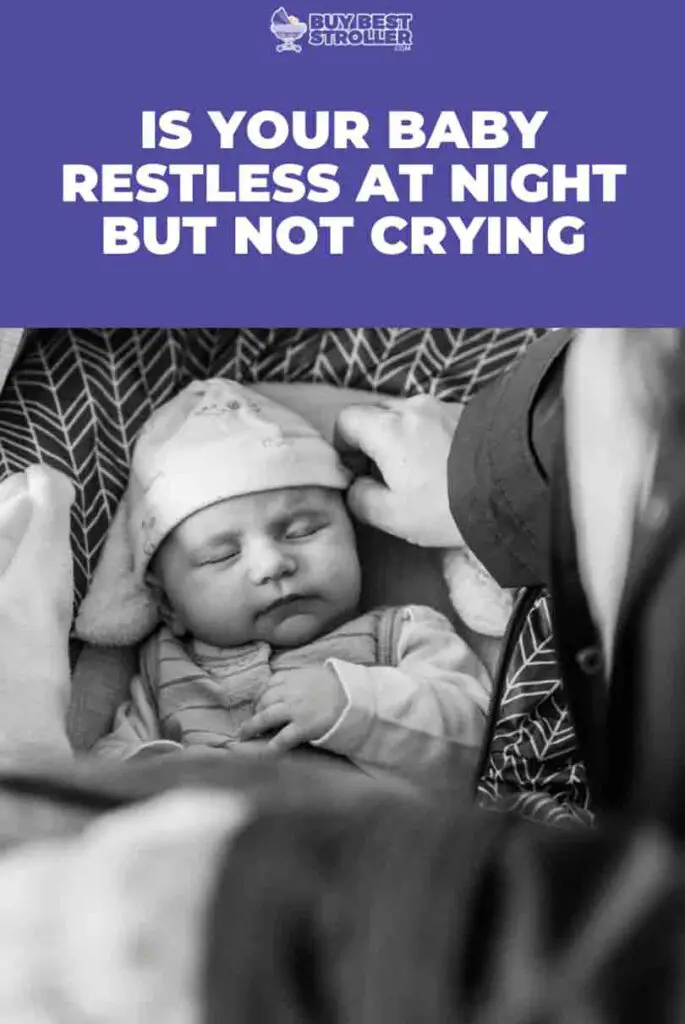Is Your Baby Restless At Night But Not Crying? Well, Occasionally, restlessness during the night may indicate a health problem.
If your baby is uncomfortable, such as hot or cold or itchy due to eczema, it can also cause disrupted sleep.
In addition, some sleep disorders can cause disrupted sleep. During sleep, restless legs syndrome may cause leg movements frequently, and sleep apnea may wake your child up. You might notice snoring and gasping in their sleep.
Restless Sleep: How To Observe It?
These are some things you might notice in a restless sleep baby:
- Tossing and turning frequently or waking without wishing to
- Loud snoring which results in choking or gasping sounds
- Teeth grinding (sleep-related bruxism)
- Movements of the limbs, getting out of bed or even sleepwalking
- Yelling or talking in sleep
When children move or talk during sleep, they may not be aware of their actions at the time and will not remember them when they wake up. Because of this, they may not realize they are restless.

What Are The Causes Of Restless Sleep In A Baby?
Newborns sleep 18 hours per day, rarely sleeping longer than three hours at a time. This may appear as restlessness to some parents, but it’s both normal and expected.
As babies become older, they sleep for longer periods. Around six months of age, they usually adopt a pattern of day-night sleep. However, in a study of 12-month-olds, nearly 28% fail to sleep for six hours without waking up, and 43% don’t sleep for more than eight hours straight.
Therefore, parents should know that infants not sleeping through the night, which may seem like restless sleep, is not uncommon and does not affect their physical or mental development.
Usually, after nine months, babies start having more restless sleep. This occurs due to several reasons such as separation anxiety at bedtime, overstimulation, a greater awareness of their environment, and early napping.
Parents need to develop healthy sleep habits for their newborns and infants. The most effective way to reduce restless sleep in babies is to promote good sleep habits from an early age.
To prevent sudden infant death syndrome (SIDS), parents should also follow safety precautions carefully.
Restless Sleep In Toddlers:
Restless sleep in toddlers may indicate an inability to self-soothe, calm down, and fall asleep. If they wake up in the middle of the night, or at the beginning of the night, they may experience this.
Toddlers often experience restless sleep at around 18 months and it may be due to separation anxiety, excess stimulation, poor sleep habits, a greater ability to walk and talk, or an increase in nightmare frequency.
You can help your baby’s restless sleep by implementing consistent practices such as a reliable bedtime routine, a fixed schedule, and self-soothing techniques.
If you are concerned about either of these things, you should contact your child’s health care provider.
No matter what the cause, if your baby tends to be restless at night, waking up grumpy and tired, please discuss this with your physician. After sleeping, when a baby wakes up feeling refreshed and calm, that means that he slept normally during the night.
How Can You Soothe A Restless Baby?
Using the following techniques will help you calm your restless baby:
1. Learn To Swaddle Your Baby:
Swaddling is a proven way to calm a baby. With a blanket wrapped snugly around your baby, you can provide warmth and security. Consult your pediatrician if you’re unsure how to safely swaddle a baby.
2. Wear Your Child:
No matter how much you may just want to be in a different room from your child, babies who have more skin-to-skin contact are less likely to cry. Follow safety guidelines for using a sling or carrier and pick a sling or carrier that is the right size for your baby.
3. Change Of Scenery:
Babies enjoy the fresh air and a change in scenery as much as we do. When babies become a little older, they enjoy going for walks and playing outside, and if it falls around the same time every day, they grow to expect it. It can make them grumpy if that doesn’t happen. When the baby is restless, simply going into the garden with them or going for a stroll around can help calm them down.
4. Relax Your Baby With White Noise:
Whirring noise from machines such as a fan, vacuum cleaner or washer can relax your baby. When your baby is fussy, use one of these items or a white noise machine. It may be enough to simply whisper in their ear for white noise to calm your child.




